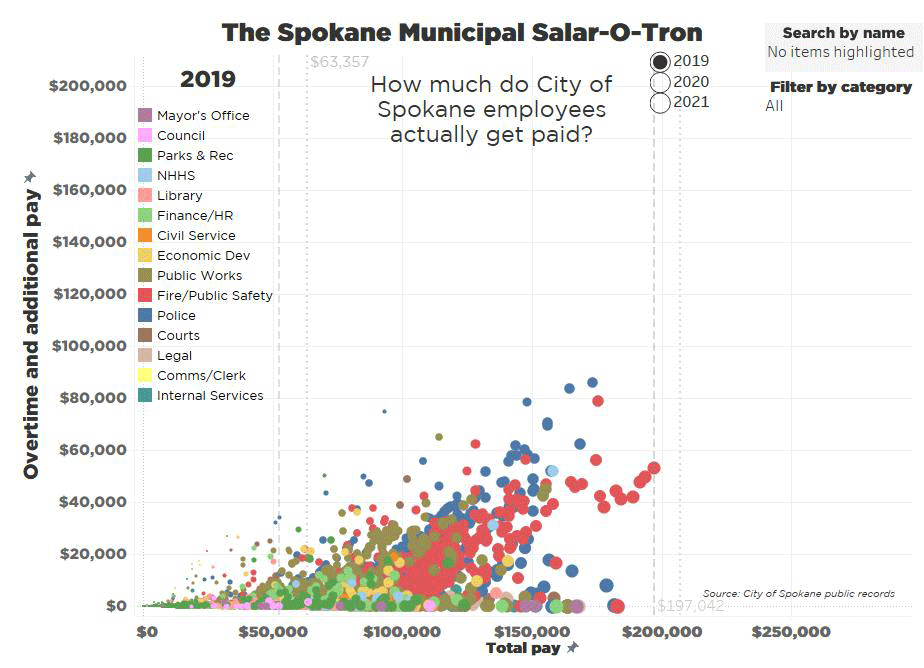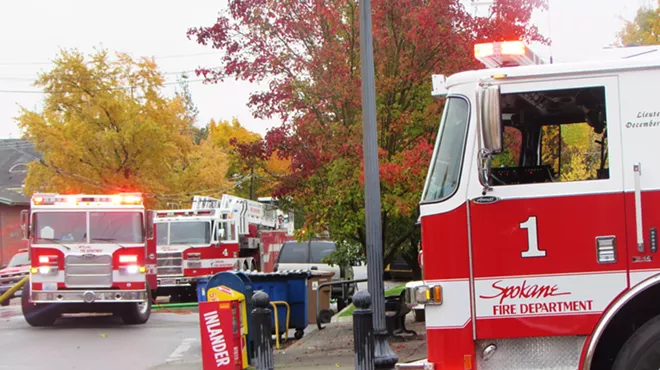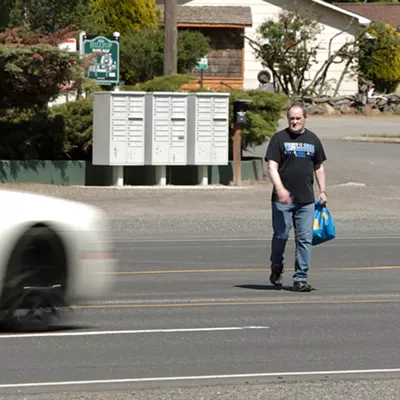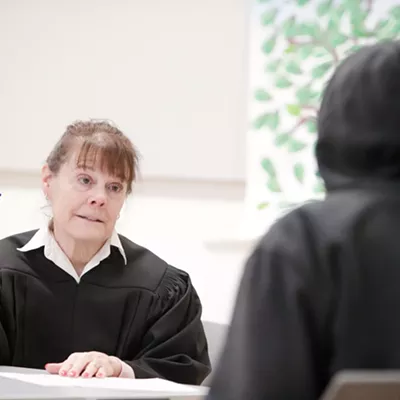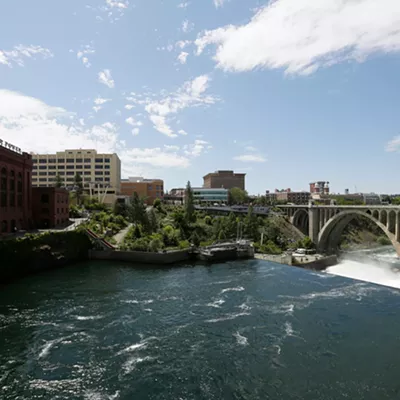It was the citizens of Spokane who came to the rescue of the Spokane Fire Department.
After an expiring federal grant put dozens of firefighter jobs in jeopardy, voters in 2019 approved raising $5.8 million annually in taxes to save 40 firefighter jobs and hire 20 police officers.
But last month, with the deadline for the city's budget looming, the fire department was asking the Spokane City Council to shell out nearly that much — an additional $5 million — to deal with just one skyrocketing last-minute bill: department overtime.
"All of a sudden, a suckerpunch of $5 million," City Council member Betsy Wilkerson says. "There's something going on here. We need to unravel this."
With a month to go, the city had already racked up $7.7 million in overtime, $1 million more than 2020's huge total. While about $1.4 million of that relates to fighting wildfires and will be reimbursed through the state Department of Natural Resources, that can't explain the scale of the increase.
It's double the overtime the city budgeted for, twice the overtime spending in 2019, and nearly six times higher than what overtime spending was a decade ago in the depths of a recession.
For the first time in his career, Fire Chief Brian Schaeffer was saying back in August that he was forcing firefighters to take overtime. Why? He had 27 positions open in his department, he said, and that was before the governor's October vaccine mandate took out nearly 40 additional staffers.
It's easy to look at the fire department's overtime and explain it as the symptom of a natural disaster: COVID sent fire department calls soaring and sparked waves of quarantines.
But like the staffing crisis in the city's human resources department, like the failure to hire a planning director, like the exodus from Community, Housing and Human Services, the crescendo of the overtime crisis in the fire department isn't just the result of the pandemic, it's also a consequence of decisions made — and decisions delayed — by city leadership across the past decade.
"What we're faced with is we don't have enough bodies," City Council member Lori Kinnear says. "And we have vacancies that should have been filled, starting last year."
This summer, it was one of Mayor Nadine Woodward's former mayoral race opponents who was ringing the alarm: firefighter Shawn Poole.
Poole had criticized the city's overuse of overtime as evidence of mismanagement back when he was running for mayor in 2019, but the situation had grown far more dire this summer. He'd repeatedly reached out to City Council members, leaking estimates of how rapidly the city's overtime bill was growing.
"Another 27k in overtime for tomorrow," he wrote to Karen Stratton on Facebook messenger in July.
"It was a running joke in the department," says Poole, who retired in October and has moved to Texas. "If you're hired under Brian Schaeffer, you're going to make millions, because you're going to get as much overtime as you can."
That's not entirely fair: The fire department overtime bill during Schaeffer's first three years as fire chief — 2017 through 2019 — was about the same as the three years before he took the helm.
During City Council member Candace Mumm's first year in office, all the way back in 2014, she stood at the West Central Community Center decrying how much the city was spending on police and fire department overtime.
Spokane Fire spent nearly $3 million on overtime that year, the highest it had been in more than a decade. But every year since has been even worse.
There's a simple way to reduce overtime: Dedicate more firefighters to a "relief pool." Since employees on overtime are a lot more expensive — getting paid an additional 50 percent of their hourly wage — theoretically, a relief pool can pay for itself.
"We would love to have a relief pool," Schaeffer says.
But when the city got the massive federal "SAFER" grant to hire 48 firefighters in late 2016, it didn't task any of those new firefighters to a relief pool to alleviate overtime. Schaeffer argues the grants wouldn't allow it.
"The grants were only about improving service, period," Schaeffer says.
And while the department went on a hiring spree, holding multiple fire academies a year to add new staffers, the fire department was also offering longtime higher-paid employees incentives to retire sooner. But when two high-level battalion chiefs left as a result, Battalion Chief Chad Childears says, their spots took months and months to fill, while the department racked up hundreds of thousands of dollars in overtime as a result.
And despite those staffing challenges, Spokane Fire didn't hold a new fire academy of recruits in 2019 at all. As the SAFER grant funding was threatening to run out in 2019, Schaeffer didn't want to invest more in staffing when funding wasn't assured.
"The mayor at the time didn't support the levy, so it wasn't a sure thing," Spokane Firefighters Union president Randy Marler says.
But the levy passed in February 2019. It isn't clear why the department waited until 2020 to try to hold another academy. And in 2020, Schaeffer argues, the pandemic had made holding an academy effectively impossible.
Yet other departments, like Boise, Seattle and Spokane Valley did hold their own recruiting training academies in 2020.
Spokane Valley has had the same kind of massive turnover and waves of retirements that other departments had — the difference is that they've been able to hire enough to compensate, so they've had to use only a fraction of the overtime that Spokane has.
"We don't really have a staffing shortage," says Andy Rorie, division fire chief of the Spokane Valley Fire Department.
Since 2019, Spokane has brought on only 10 new firefighters — and one of them was ousted because of the vaccine mandate. But Spokane Valley, a smaller fire district, brought on 28 staffers by holding more frequent and larger academies. Even in fall 2020 as COVID cases were accelerating.
But there was a cost: Spokane Valley had sent several recruits to the state's Fire Training Academy in fall 2020. But the state's academy shut down after COVID outbreak swept through their dorms, and the Valley had to finish training locally.
"It seems like every community is dealing with it differently, and interpreting the science differently," Schaeffer says. "It really put us in a really challenging position."
And that difference in approach particularly mattered when it came to responding to Gov. Jay Inslee's vaccine mandate for health care workers, which was intended to apply to fire departments.
Mayor Woodward had taken a hard line, initially arguing in a statement that finding a way to keep on the fire staffers who refused a vaccine would present "an undue hardship and too great of a risk to the public" and the department.
Yet, Spokane Valley accommodated their staffers with exemptions, requiring n95 masks, social distancing and daily testing for their vaccine-refusing firefighters, but still allowed them to go on medical calls.
"I started getting phone calls from the public upset that we were sending people that weren't vaccinated into people's homes," Schaeffer says. "I had to tell them that we were not the Valley."
The Spokane Fire Department has managed to reduce their initial losses of 39 firefighters — 14 decided to get fully vaccinated, for example, and five were accommodated in the fire dispatch center. But Spokane Valley didn't lose anyone to the mandate.
The cost of the vaccine mandate for Spokane may be even higher than that: The Woodward administration ordered a forensic audit after finding a suspicious spike in sick leave.
While Marler, the union president, says his "gut feeling" is that there has "been no abuse of sick leave," the city's data shows that sick leave skyrocketed in October, when Inslee's vaccine mandate hit, then fell sharply in November.
On Monday night, the Spokane City Council agreed to shell out $3.5 million to the fire department in levy funds to compensate for the extra overtime, calculating that they could use some of the funding for vacant positions to reduce the total from $5 million.
But the council was clearly frustrated. They'd funded a comprehensive external study of police and fire overtime more than a year ago, but it hadn't been completed.
City administration waited over seven months — until July 21 — before even putting it out for a bid. By late August, the city's chief financial officer assured frustrated City Council members that they were about three or four weeks away from selecting a firm to conduct the study. By mid-September, a city panel had graded all the applicants, giving the Matrix Consulting Group the highest overall score.
But the city waited until November to tell Matrix they'd been chosen.
"In my opinion, the delay cost the citizens millions of dollars," says Council member Candace Mumm.
In the spring, the city had first conducted its own internal overtime audit of the fire department. But the audit only examined a single year. Schaeffer says "it was significantly missing what we were looking for" and the City Council was never shown the results.
The council struggled to understand how the fire department hadn't been aware of how big their overtime problem had grown until the last minute.
"How is somebody's computer not flashing bright red and screaming at you, 'You're over budget. Fix this now'?" City Council member Michael Cathcart asks.
This year, the city has indeed been focused on replacing the archaic budgeting and scheduling software. And going forward, Schaeffer says he plans to try to recruit a wave of new staffers, including by potentially holding multiple fire academies next year. But he's still dogged by uncertainty.
"What I'm struggling with is we don't know a lot about omicron," Schaeffer says, referring to the most recent COVID variant. "What is going to happen when I bring these people in from all over the country for an academy? I can't put their lives at risk."♦





